Professional consulting firm ICF International (NASDAQ:ICFI) met Wall Street’s revenue expectations in Q1 CY2025, but sales fell by 1.4% year on year to $487.6 million. Its non-GAAP profit of $1.94 per share was 12.1% above analysts’ consensus estimates.
Is now the time to buy ICF International? Find out in our full research report .
ICF International (ICFI) Q1 CY2025 Highlights:
Commenting on the results, John Wasson, chair and chief executive officer, said "First quarter revenues were in line with our expectations. Revenues from our commercial, state and local and international government clients increased 12.6% in the aggregate to now account for approximately 51% of first quarter revenues. This performance essentially offset a 12.6% decline in federal government revenue due to changes in spending priorities by the new administration.
Company Overview
Operating at the intersection of policy, technology, and implementation for over five decades, ICF International (NASDAQ:ICFI) provides professional consulting services and technology solutions to government agencies and commercial clients across energy, health, environment, and security sectors.
Sales Growth
A company’s long-term performance is an indicator of its overall quality. Any business can put up a good quarter or two, but many enduring ones grow for years.
With $2.01 billion in revenue over the past 12 months, ICF International is a mid-sized business services company, which sometimes brings disadvantages compared to larger competitors benefiting from better economies of scale. On the bright side, it can still flex high growth rates because it’s working from a smaller revenue base.
As you can see below, ICF International grew its sales at a decent 6.1% compounded annual growth rate over the last five years. This shows its offerings generated slightly more demand than the average business services company, a useful starting point for our analysis.
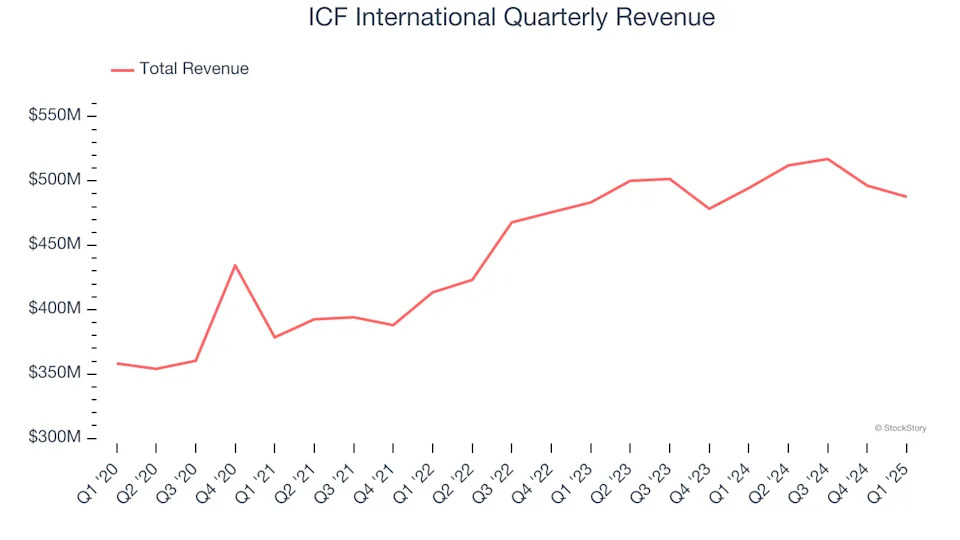
Long-term growth is the most important, but within business services, a half-decade historical view may miss new innovations or demand cycles. ICF International’s recent performance shows its demand has slowed as its annualized revenue growth of 4.3% over the last two years was below its five-year trend.
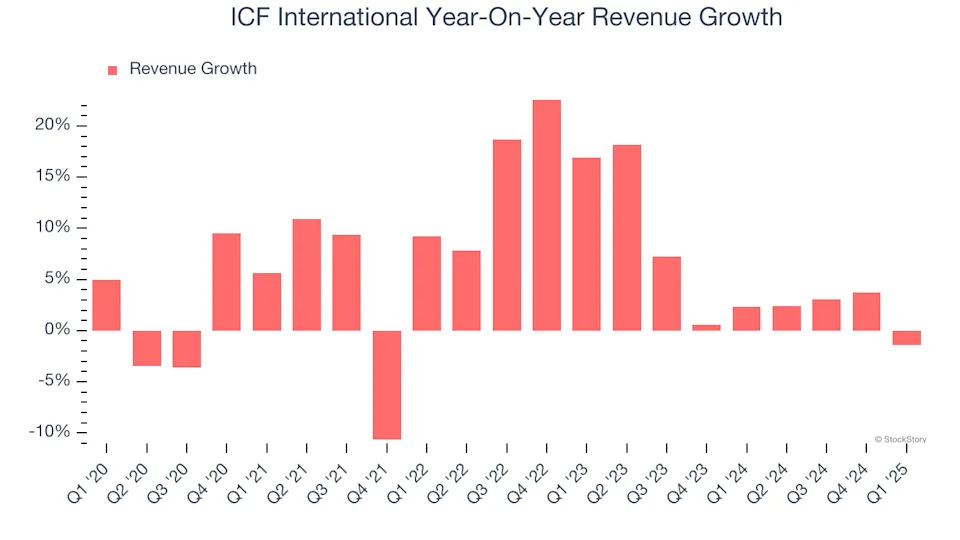
This quarter, ICF International reported a rather uninspiring 1.4% year-on-year revenue decline to $487.6 million of revenue, in line with Wall Street’s estimates.
Looking ahead, sell-side analysts expect revenue to decline by 4.9% over the next 12 months, a deceleration versus the last two years. This projection is underwhelming and suggests its products and services will face some demand challenges.
Today’s young investors likely haven’t read the timeless lessons in Gorilla Game: Picking Winners In High Technology because it was written more than 20 years ago when Microsoft and Apple were first establishing their supremacy. But if we apply the same principles, then enterprise software stocks leveraging their own generative AI capabilities may well be the Gorillas of the future. So, in that spirit, we are excited to present our Special Free Report on a profitable, fast-growing enterprise software stock that is already riding the automation wave and looking to catch the generative AI next .
Operating Margin
Operating margin is an important measure of profitability as it shows the portion of revenue left after accounting for all core expenses – everything from the cost of goods sold to advertising and wages. It’s also useful for comparing profitability across companies with different levels of debt and tax rates because it excludes interest and taxes.
ICF International was profitable over the last five years but held back by its large cost base. Its average operating margin of 7% was weak for a business services business.
On the plus side, ICF International’s operating margin rose by 1.5 percentage points over the last five years, as its sales growth gave it operating leverage.
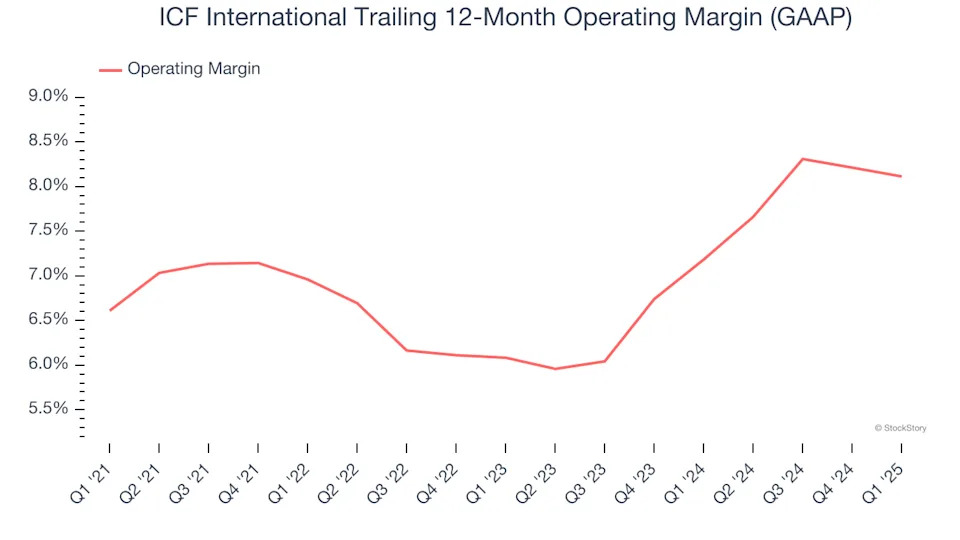
This quarter, ICF International generated an operating profit margin of 7.9%, in line with the same quarter last year. This indicates the company’s overall cost structure has been relatively stable.
Earnings Per Share
We track the long-term change in earnings per share (EPS) for the same reason as long-term revenue growth. Compared to revenue, however, EPS highlights whether a company’s growth is profitable.
ICF International’s EPS grew at a spectacular 13.2% compounded annual growth rate over the last five years, higher than its 6.1% annualized revenue growth. This tells us the company became more profitable on a per-share basis as it expanded.
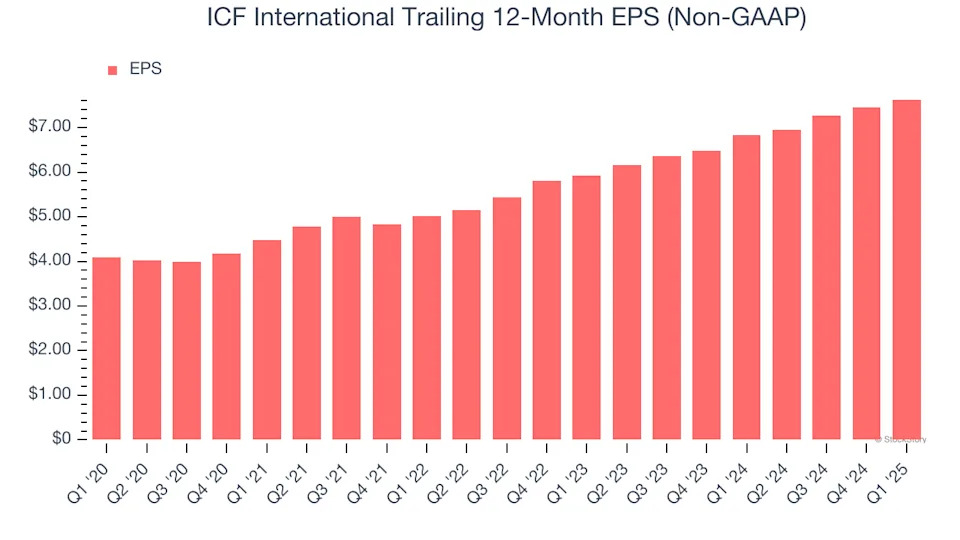
We can take a deeper look into ICF International’s earnings quality to better understand the drivers of its performance. As we mentioned earlier, ICF International’s operating margin was flat this quarter but expanded by 1.5 percentage points over the last five years. On top of that, its share count shrank by 3%. These are positive signs for shareholders because improving profitability and share buybacks turbocharge EPS growth relative to revenue growth.
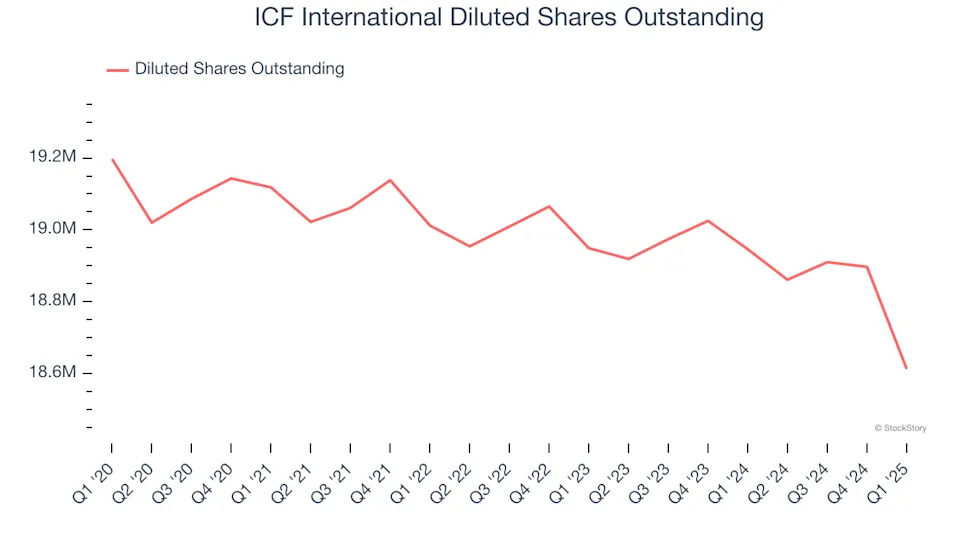
In Q1, ICF International reported EPS at $1.94, up from $1.77 in the same quarter last year. This print easily cleared analysts’ estimates, and shareholders should be content with the results. Over the next 12 months, Wall Street expects ICF International’s full-year EPS of $7.63 to shrink by 9.3%.
Key Takeaways from ICF International’s Q1 Results
We enjoyed seeing ICF International beat analysts’ EPS expectations this quarter despite in-line revenue. Overall, this quarter wasn't perfect, but it was solid. The stock remained flat at $85.28 immediately following the results.
ICF International may have had a good quarter, but does that mean you should invest right now? The latest quarter does matter, but not nearly as much as longer-term fundamentals and valuation, when deciding if the stock is a buy. We cover that in our actionable full research report which you can read here, it’s free .





